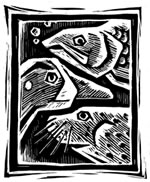- Home
- Restoration Projects
- Project Search
- HRM Program: Validation of Acoustic Surveys for Pacific Herring Using Direct Capture 14120111-A
Project Information
Title: HRM Program: Validation of Acoustic Surveys for Pacific Herring Using Direct Capture 14120111-A
Project Year and Number: 2014: 14120111-A
Other Fiscal Years and Numbers for this Project: 2016: 16120111-A, 2015: 15120111-A, 2013: 13120111-A, 2012: 12120111-A
Principal Investigator (PI): Mary Anne Bishop
Managing Agency: NOAA
Assisting Personnel: None
Project Website: https://pwssc.org/herring/
Research Location: Prince William Sound
Restoration Category: Monitoring
Injured Resources Addressed: Pacific Herring
Abstract:Acoustic surveys provide a relatively low-cost, remote sensing tool to estimate species-specific fish biomass and abundance. Interpreting acoustic data requires accurate ground truthing of acoustic backscatter to confirm species and length frequency of insonified targets. Since November 2012, juvenile and adult herring acoustic surveys have been conducted in November and late March, respectively. Pelagic trawls are the recommended method for validating species composition and for obtaining relatively unbiased information on length frequency distribution, age, and other biological information. Here we propose to use a low-resistance, light-weight midwater sweeper trawl capable of towing speeds (up to 3 knots) as a method to ground truth acoustic surveys for juvenile herring. Our pelagic trawl surveys will take place in conjunction with and onboard the same vessel as three studies in the PWS Herring Research and Monitoring program: a) Juvenile Herring Abundance Index (years 2-5); b) Acoustic Consistency: Intensive Surveys of Juvenile Herring (year 3). Because of concerns of the Alaska Department of Fish and Game, for the March Expanded Adult Herring Surveys (years 2-5) we are being required to use gillnets and jigging for validation. Our project will provide data on species composition and length frequency to aid in the interpretation of current and historical acoustic surveys. In addition it will provide adult herring samples to Alaska Department of Fish and Game for the adult herring age-structure-analyses model and will provide juvenile herring samples to researchers investigating juvenile herring fitness and disease. Our trawls will also provide fishery-independent surveys for non-herring species, thus increasing our knowledge of pelagic fishes in Prince William Sound.
Proposal: View (187 KB)
Reports:
Annual Report FY14: View (362 KB)
Final Report: See Project 16120111-A
Publications from this Project: None Available
